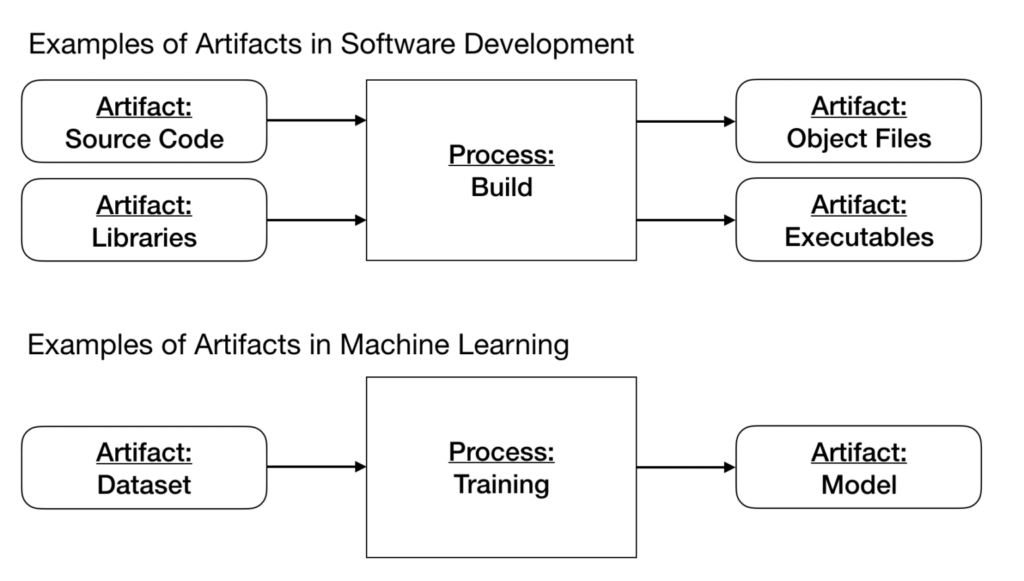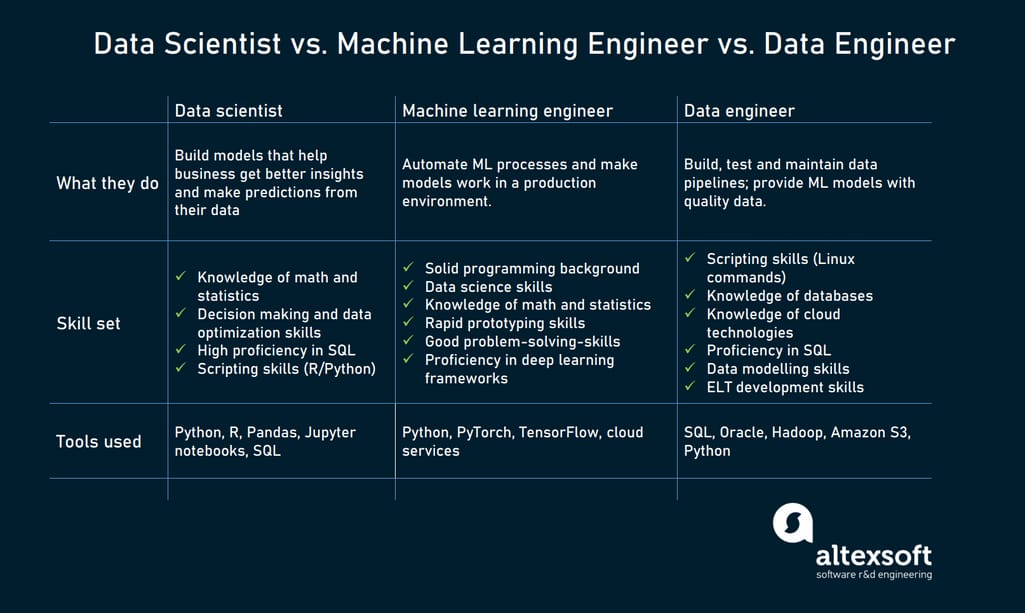All Categories
Featured
Table of Contents
- – 3 Easy Facts About Zuzoovn/machine-learning-fo...
- – The Basic Principles Of What Is The Best Route...
- – How I Went From Software Development To Machi...
- – Get This Report about I Want To Become A Mach...
- – 9 Easy Facts About Certificate In Machine Le...
- – The smart Trick of Embarking On A Self-taugh...
- – The 3-Minute Rule for How To Become A Machin...
Some people believe that that's cheating. Well, that's my whole profession. If someone else did it, I'm going to utilize what that individual did. The lesson is putting that apart. I'm forcing myself to think through the possible options. It's even more regarding eating the web content and attempting to apply those ideas and less concerning finding a library that does the work or searching for somebody else that coded it.
Dig a little bit deeper in the math at the beginning, just so I can build that structure. Santiago: Ultimately, lesson number seven. I do not believe that you have to understand the nuts and screws of every formula prior to you use it.
I have actually been utilizing semantic networks for the lengthiest time. I do have a sense of exactly how the slope descent works. I can not clarify it to you today. I would have to go and inspect back to actually obtain a much better intuition. That doesn't indicate that I can not resolve things making use of neural networks? (29:05) Santiago: Trying to force individuals to believe "Well, you're not mosting likely to achieve success unless you can explain every solitary information of just how this functions." It goes back to our arranging instance I assume that's simply bullshit guidance.
As a designer, I have actually functioned on numerous, many systems and I have actually used lots of, many things that I do not recognize the nuts and screws of just how it works, even though I recognize the impact that they have. That's the last lesson on that thread. Alexey: The funny point is when I think concerning all these libraries like Scikit-Learn the algorithms they make use of inside to implement, for example, logistic regression or something else, are not the like the formulas we examine in maker learning classes.
3 Easy Facts About Zuzoovn/machine-learning-for-software-engineers Described
So also if we attempted to learn to obtain all these basics of machine learning, at the end, the algorithms that these collections use are various. Right? (30:22) Santiago: Yeah, absolutely. I believe we require a great deal extra pragmatism in the sector. Make a lot more of an effect. Or concentrating on delivering value and a little less of purism.

I typically talk to those that desire to work in the industry that want to have their effect there. I do not dare to talk concerning that because I don't recognize.
Right there outside, in the market, pragmatism goes a long method for sure. Santiago: There you go, yeah. Alexey: It is a good inspirational speech.
The Basic Principles Of What Is The Best Route Of Becoming An Ai Engineer?
Among the important things I wished to ask you. I am taking a note to speak about ending up being better at coding. Initially, let's cover a pair of things. (32:50) Alexey: Allow's start with core tools and structures that you require to discover to really change. Let's state I am a software program engineer.
I know Java. I know SQL. I recognize just how to make use of Git. I recognize Celebration. Perhaps I understand Docker. All these things. And I become aware of artificial intelligence, it seems like an amazing point. So, what are the core tools and frameworks? Yes, I watched this video and I get convinced that I do not require to get deep right into math.
Santiago: Yeah, definitely. I think, number one, you ought to begin learning a little bit of Python. Because you currently know Java, I do not believe it's going to be a substantial transition for you.
Not since Python is the very same as Java, however in a week, you're gon na get a great deal of the differences there. You're gon na have the ability to make some progression. That's leading. (33:47) Santiago: Then you get specific core devices that are going to be made use of throughout your whole profession.
How I Went From Software Development To Machine ... Things To Know Before You Buy
You obtain SciKit Learn for the collection of machine discovering algorithms. Those are tools that you're going to have to be using. I do not advise simply going and discovering regarding them out of the blue.
Take one of those training courses that are going to start presenting you to some issues and to some core concepts of machine learning. I don't remember the name, however if you go to Kaggle, they have tutorials there for cost-free.
What's great regarding it is that the only demand for you is to know Python. They're going to provide a problem and inform you exactly how to utilize decision trees to fix that details problem. I assume that process is very powerful, since you go from no machine learning background, to understanding what the problem is and why you can not solve it with what you understand today, which is straight software program design practices.
Get This Report about I Want To Become A Machine Learning Engineer With 0 ...
On the various other hand, ML engineers concentrate on building and deploying machine knowing designs. They concentrate on training versions with information to make predictions or automate tasks. While there is overlap, AI engineers handle even more diverse AI applications, while ML engineers have a narrower concentrate on equipment understanding algorithms and their useful implementation.

Device learning engineers concentrate on developing and releasing maker understanding versions into production systems. They deal with engineering, making certain designs are scalable, reliable, and integrated into applications. On the other hand, information researchers have a broader role that includes information collection, cleansing, expedition, and building models. They are frequently accountable for removing insights and making data-driven decisions.
As organizations progressively take on AI and machine knowing technologies, the demand for proficient experts grows. Device understanding engineers function on innovative jobs, contribute to advancement, and have competitive incomes.
ML is fundamentally different from traditional software growth as it concentrates on teaching computers to gain from information, as opposed to shows explicit regulations that are executed systematically. Uncertainty of results: You are probably made use of to writing code with predictable results, whether your feature runs when or a thousand times. In ML, however, the end results are much less specific.

Pre-training and fine-tuning: Just how these models are trained on vast datasets and then fine-tuned for certain tasks. Applications of LLMs: Such as text generation, sentiment evaluation and details search and retrieval. Papers like "Attention is All You Need" by Vaswani et al., which introduced transformers. On-line tutorials and training courses concentrating on NLP and transformers, such as the Hugging Face course on transformers.
9 Easy Facts About Certificate In Machine Learning Explained
The capability to handle codebases, merge adjustments, and deal with problems is equally as crucial in ML growth as it is in traditional software projects. The skills developed in debugging and screening software application applications are very transferable. While the context could alter from debugging application reasoning to identifying concerns in information processing or model training the underlying principles of systematic examination, hypothesis testing, and iterative refinement coincide.
Equipment understanding, at its core, is greatly dependent on stats and possibility theory. These are essential for comprehending just how algorithms pick up from information, make forecasts, and examine their efficiency. You should think about becoming comfortable with concepts like analytical importance, distributions, hypothesis screening, and Bayesian thinking in order to layout and interpret designs effectively.
For those curious about LLMs, a comprehensive understanding of deep understanding styles is beneficial. This consists of not just the auto mechanics of semantic networks yet also the style of certain models for different usage cases, like CNNs (Convolutional Neural Networks) for image processing and RNNs (Recurrent Neural Networks) and transformers for consecutive data and natural language handling.
You must be aware of these issues and discover strategies for identifying, mitigating, and communicating regarding prejudice in ML designs. This includes the possible impact of automated decisions and the ethical effects. Several models, especially LLMs, call for significant computational sources that are frequently supplied by cloud systems like AWS, Google Cloud, and Azure.
Structure these skills will certainly not only promote a successful shift into ML however likewise make certain that programmers can contribute properly and properly to the innovation of this dynamic field. Concept is necessary, however nothing beats hands-on experience. Start servicing tasks that enable you to apply what you have actually learned in a functional context.
Develop your tasks: Beginning with basic applications, such as a chatbot or a text summarization device, and gradually boost complexity. The field of ML and LLMs is swiftly evolving, with brand-new innovations and modern technologies arising on a regular basis.
The smart Trick of Embarking On A Self-taught Machine Learning Journey That Nobody is Discussing
Contribute to open-source jobs or compose blog articles concerning your learning journey and jobs. As you obtain know-how, begin looking for possibilities to include ML and LLMs right into your work, or look for brand-new roles focused on these innovations.

Vectors, matrices, and their duty in ML algorithms. Terms like model, dataset, features, labels, training, reasoning, and recognition. Information collection, preprocessing methods, design training, evaluation processes, and deployment considerations.
Decision Trees and Random Forests: Instinctive and interpretable designs. Matching trouble types with proper designs. Feedforward Networks, Convolutional Neural Networks (CNNs), Recurrent Neural Networks (RNNs).
Data flow, improvement, and attribute engineering approaches. Scalability concepts and efficiency optimization. API-driven techniques and microservices combination. Latency monitoring, scalability, and version control. Continual Integration/Continuous Release (CI/CD) for ML workflows. Version surveillance, versioning, and performance monitoring. Discovering and resolving modifications in version efficiency with time. Dealing with efficiency traffic jams and resource administration.
The 3-Minute Rule for How To Become A Machine Learning Engineer - Uc Riverside

You'll be introduced to 3 of the most appropriate elements of the AI/ML technique; managed understanding, neural networks, and deep knowing. You'll grasp the differences in between conventional shows and maker understanding by hands-on growth in monitored knowing before building out complicated distributed applications with neural networks.
This training course acts as an overview to maker lear ... Program More.
Table of Contents
- – 3 Easy Facts About Zuzoovn/machine-learning-fo...
- – The Basic Principles Of What Is The Best Route...
- – How I Went From Software Development To Machi...
- – Get This Report about I Want To Become A Mach...
- – 9 Easy Facts About Certificate In Machine Le...
- – The smart Trick of Embarking On A Self-taugh...
- – The 3-Minute Rule for How To Become A Machin...
Latest Posts
Full Guide: How To Prepare For A Technical Coding Interview
The Complete Guide To Software Engineering Interview Preparation
Cracking The Mid-level Software Engineer Interview – Part I (Concepts & Frameworks)
More
Latest Posts
Full Guide: How To Prepare For A Technical Coding Interview
The Complete Guide To Software Engineering Interview Preparation
Cracking The Mid-level Software Engineer Interview – Part I (Concepts & Frameworks)